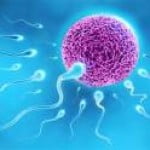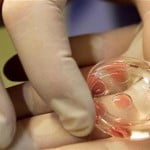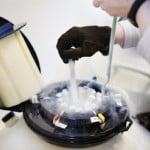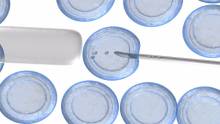Sperm donation is an IVF method applied to men who, for some reasons, cannot produce sperm; do not have sufficient sperm count or whose sperms are not healthy enough to produce a good quality embryo. It involves producing an embryo, by using the sperm of a healthy donor and the future-mother’s eggs, and placing it inside the patient’s womb.
Sperm Donation and Transfering Process
Sperm used in sperm donation from sperm banks of countries such as the US or Denmark is received from healthy and fertile donor men who have undergone extensive medical tests and whose medical, ethnic and physical data are recorded.
We recommend sperm donation treatment to…
- ” men who cannot produce sperm (azoospermia) by birth or due to a condition at later ages
- ” men with contagious diseases like HIV
- ” men with genetically hereditary diseases which have not been properly diagnosed
- ” men from whom no sperm could be received even after Micro-Tese, Tese and Tesa methods
- ” women who want to be single parents
- ” in cases when sperm is present but with structural problems and that cannot fertilize the egg
- ” when there is effective RH mismatch
*Before sperm donation treatment, the female partner should first undergo examination, ultrasound examination and some hormone tests and if all is well and other tests should be done, and then, the couple can start with the treatment. Afterwards, the female partner is monitored for her ultrasound, hormone and oocyte (egg) production scans.
Sperm used in sperm donation treatment and obtained from sperm banks (usually from Denmark, the UK and the US) are received from fertile and health men and frozen under special circumstances.
Only sperm approved by the ministry of health and certified regarding all compulsory tests can be used in this treatment. The certificates from sperm banks also include data about the donor’s educational and ethnic background and physical attributes.
- ” HIV
- ” Hepatitis B
- ” Hepatitis C
- ” Syphilis
- ” Chlamydia
- ” Gonorrhea
- ” Karyotype 46 xy and if the results are clean, the donor is accepted to the program. Additional tests (thalassemia, cystic fibrosis, sickle cell anemia etc.) may also be required depending on the country and state regulations of the bank.
Blood type and RH of donor should be known. Donor’s sperms should be frozen and kept for about 6 months until the second tests regarding infectious diseases such as HIV are done. It should be noted that none of those scans/tests are 100% guaranteed. Although very small, there is a risk of an infection or genetic condition. If test results are clean, the donor is asked to provide 24 ejaculations in total (once or twice a week), and the semen is frozen after analysis.
In addition to a detailed examination, the doctor will investigate the candidate mother’s medical and family background. The uterus and the tubes should also be assessed via vaginal ultrasound and hysterosalpingography scan.
Hysterosalpingography can be postponed to a later date for women who do not have any tubular condition history. Hormone tests regarding ovulation may be required. Blood type and RH are determined.
There are two approaches to donor sperm treatment; intrauterine insemination and IVF. *Both partners should provide a written consent.
Both partners are required to go through sexually infectious diseases such as HIV, hepatitis B and C. The female partner’s immunization regarding rubella and cytomegalovirus should be determined. Samples should be collected from the cervix to investigate for chlamydia and gonorrhea.
The decision is made by matching sperm which is fully assessed and received from a healthy donor with a matching RH factor and matching physical attributes to the mother and father.
Frozen sperm from the bank is thawed when it’s time to collect eggs from the woman. Then, microinjection and embryo transfer follows.
Success in sperm donation treatment
Success depends on the female partner’s age, oocyte reserve and her response to the treatment. As in other microinjection applications, usually, there is a chance of multiple pregnancies.











